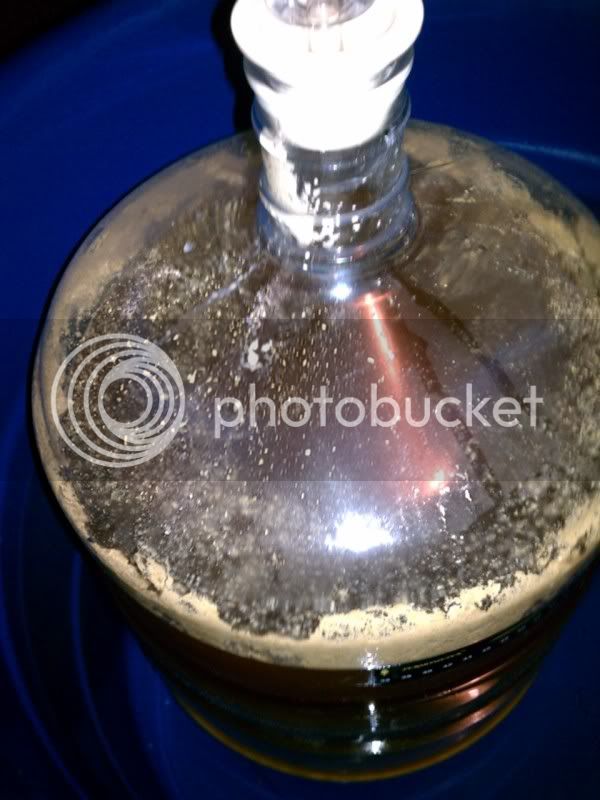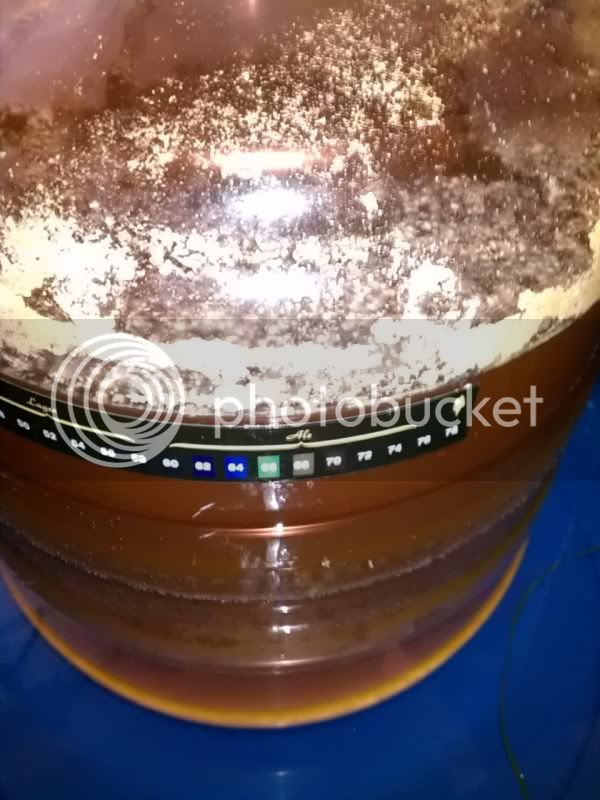I have been lurking for awhile, gleaning as much info as I can on this great site. Everything I have read, lead me to all grain. Fortunately I had most everything already so start up was not horrible. All I really needed was a mash tun which I made out of a cooler with braided SS hose, and an IC made from 1/2" ID copper. I will need a larger kettle but managed around that.
I decided on an Ale until I can get a fridge for lagering. Soon! I combined the Bee Cave Haus Ale with the Orange Pale Ale. Essentially brewing the Haus Ale with the addition of sweet orange peel and coriander.
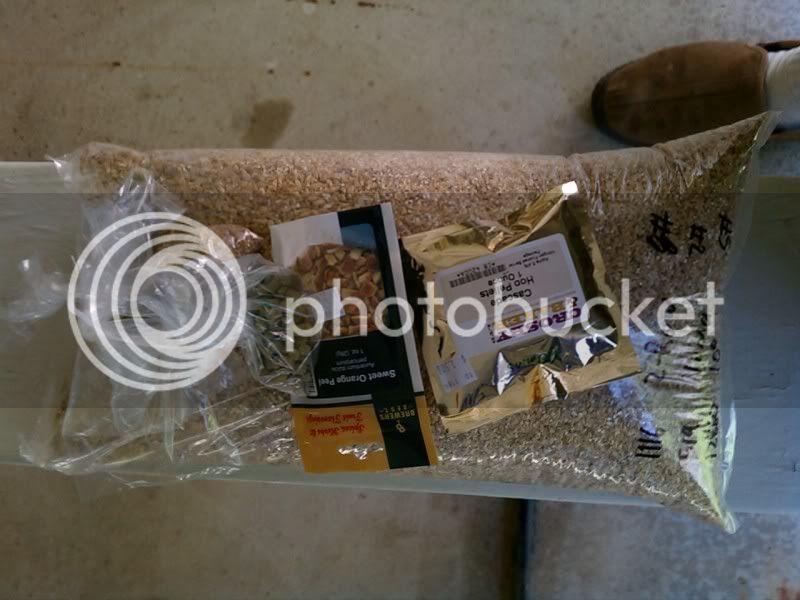
I preheated the mash tun while heating up the strike water to 162F. Nearing that temp I drained the mash tun. I then added my strike water and then grain.
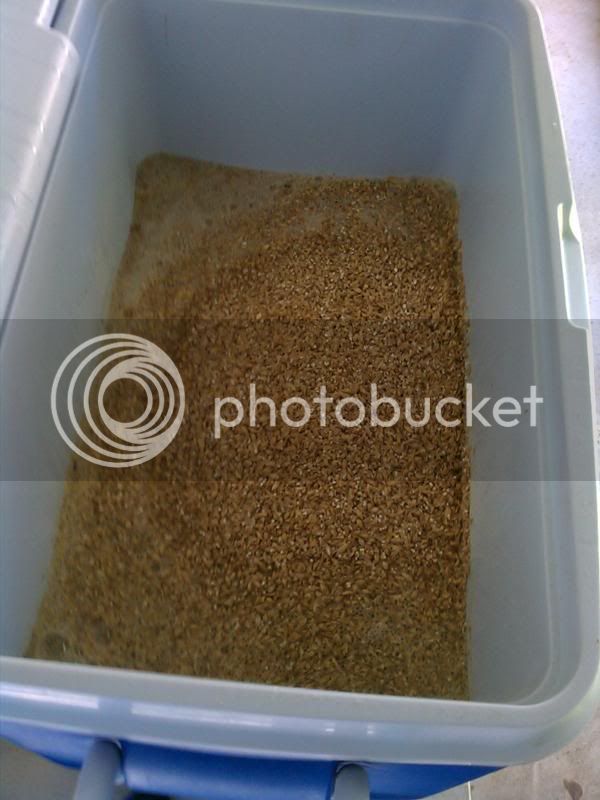
I doughed in and took a temp reading. It was at 156F. The mash temp in the Haus Ale recipe is 152. The temp jumped to 158F so I cooled down with some ice cubes. I got the temp to 154F and left it there assuming a drop in temps. After 35 minutes the temp was at 153F. 10 minutes later it was at 152F. So I had a 2F variation from start to finish. I was happy.
I added 5qts of 175F water right before vorlauft, and then drained my first runnings. I then added the sparge water and stirred slightly and let sit for 10 minutes. Then I began vorlauft, and my second running.
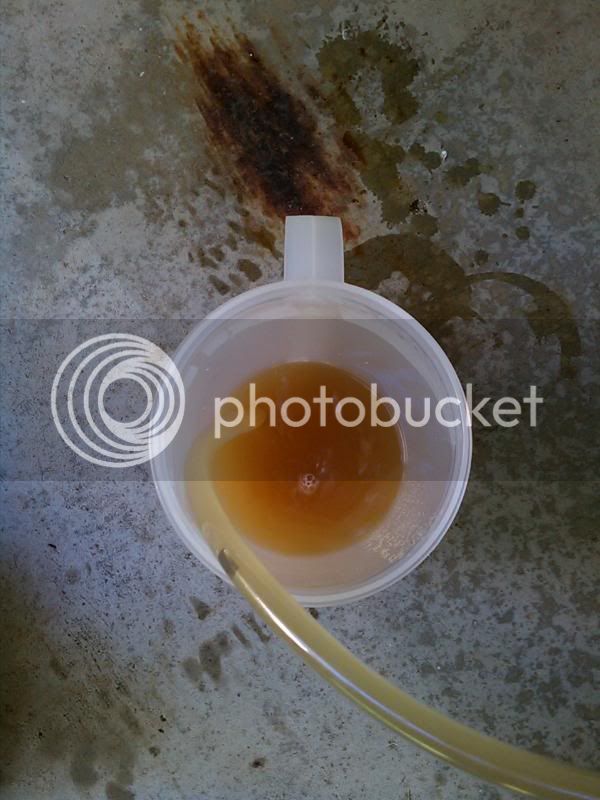
Since unfortunately my Kettle is only 6 gallons I had to figure a way around that as I had 6.5 gallons of wort to boil. I boiled in my kettle and my canner at the same time adding 90% of my hops, orange peel and coriander to the large kettle and the remainder to the canner. As the large kettle would reduce down I would add from the canner to the kettle.
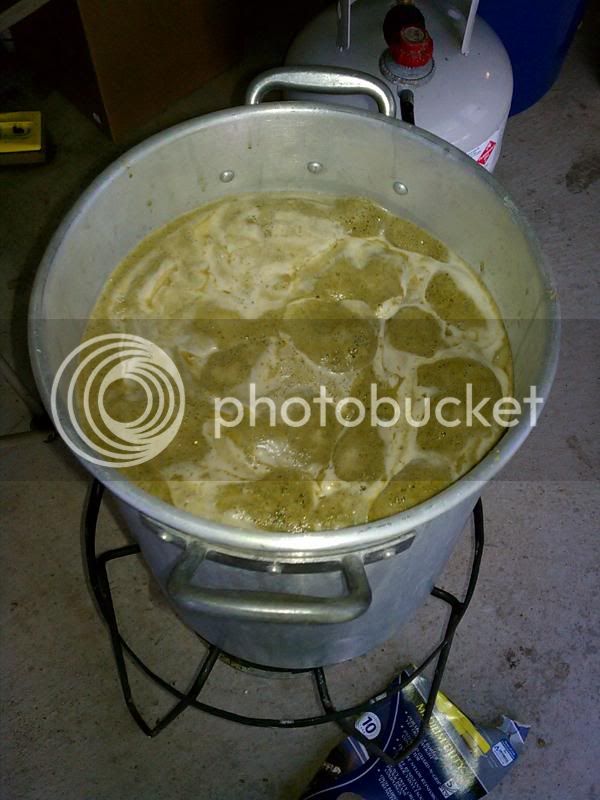
The recipe called for a 60 minute boil, but at the end of 60 minutes I had more than 5 gallons so I continued to boil for a total of 90 minutes. I should have done a harder boil. It's all a learning process right?!
During the boil I did my hop additions as per the recipe except that the last one was adjusted due to the lack of proper reduction of the wort. I had also put the IC in during the last 15 minutes of the first hour to sterilize, but once I realized a longer boil was in order I left it in.
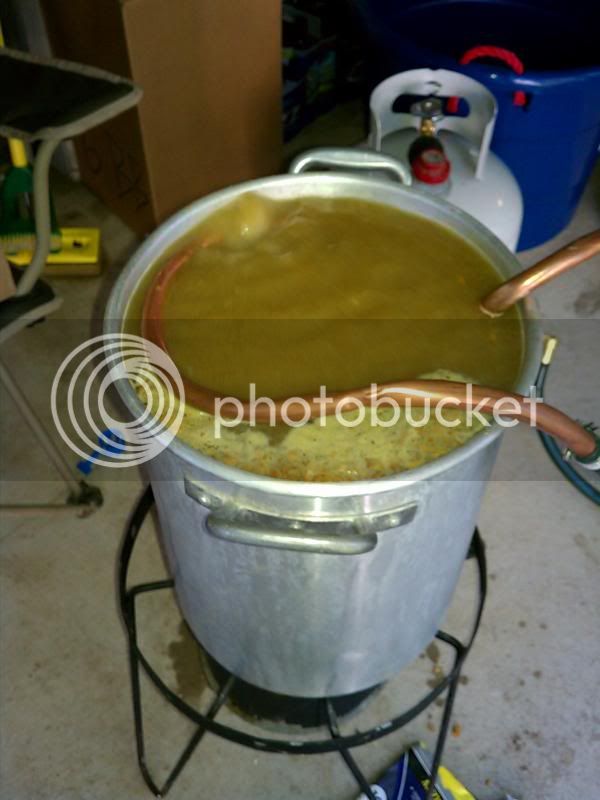
Once proper reduction was achieved I turned on the IC and noticed a rapid drop in temps. Unfortunately my Taylor thermometer took a dump on me and wasn't reading correctly. (I learned today through searching that the probe should not be submerged!) So I dont have an accurate time of chilling to the desired range of 70-75. Basically, I ran the water a lot longer than needed to chill. I grabbed my instant read and I was right on at 75F.
I siphoned off the wort into my carboy and then aerated with my drill and a mix-stir. I then pitched my yeast, and put it away.
Here is the color of it. A nice golden amber.
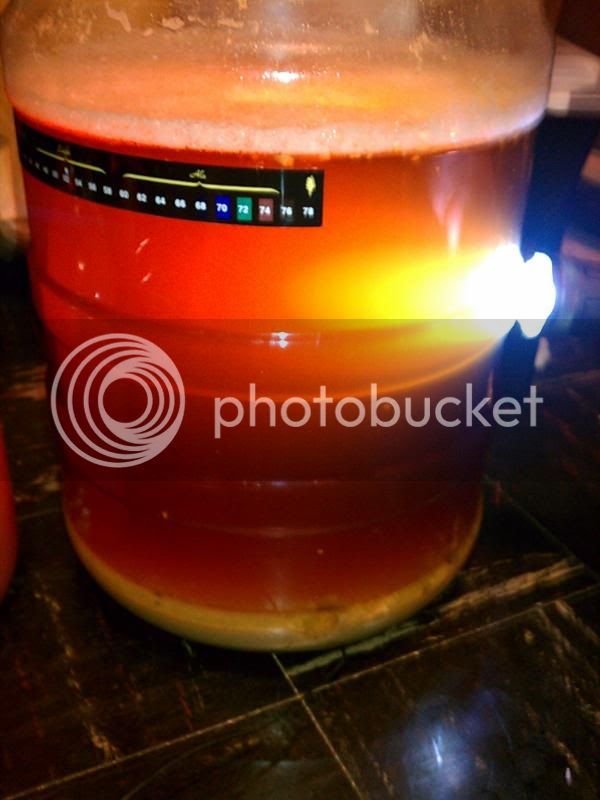
And here it is 12 hours later doing its thing.
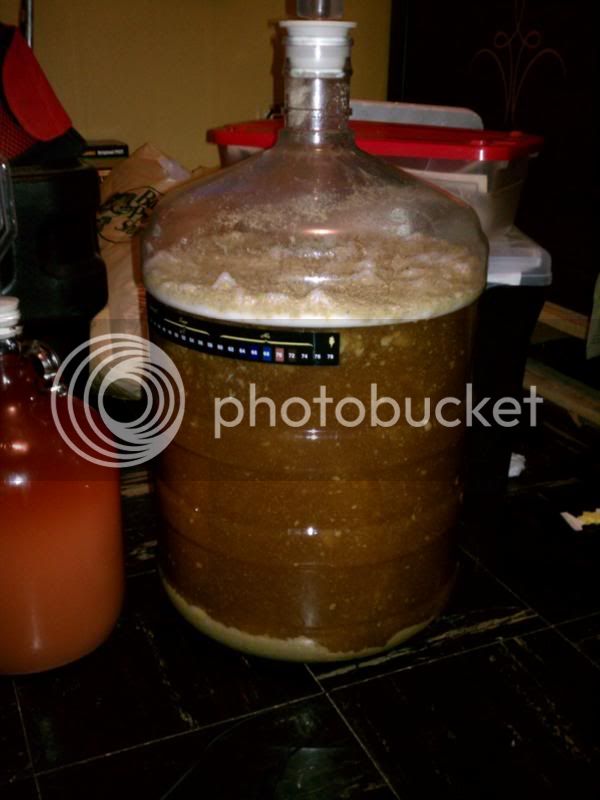
This calls for a 7-10 day ferment at 68F My "man cave" temped out at 68F with a floor temp of 66F. The fermometer showed between 70 and 68 so it should have been real close. Although this morning to be safe I put it in a tub with cool water and a frozen bottle of water. The fermometer reads 68 now. This is 38-40 hours after pitching.
The smell is good coming out of the air lock. It is a nice citrusy hoppiness!
Considering a few speed bumps along the way I am optimistic and looking forward to a few frosty pints in the weeks to come.
I decided on an Ale until I can get a fridge for lagering. Soon! I combined the Bee Cave Haus Ale with the Orange Pale Ale. Essentially brewing the Haus Ale with the addition of sweet orange peel and coriander.

I preheated the mash tun while heating up the strike water to 162F. Nearing that temp I drained the mash tun. I then added my strike water and then grain.

I doughed in and took a temp reading. It was at 156F. The mash temp in the Haus Ale recipe is 152. The temp jumped to 158F so I cooled down with some ice cubes. I got the temp to 154F and left it there assuming a drop in temps. After 35 minutes the temp was at 153F. 10 minutes later it was at 152F. So I had a 2F variation from start to finish. I was happy.
I added 5qts of 175F water right before vorlauft, and then drained my first runnings. I then added the sparge water and stirred slightly and let sit for 10 minutes. Then I began vorlauft, and my second running.

Since unfortunately my Kettle is only 6 gallons I had to figure a way around that as I had 6.5 gallons of wort to boil. I boiled in my kettle and my canner at the same time adding 90% of my hops, orange peel and coriander to the large kettle and the remainder to the canner. As the large kettle would reduce down I would add from the canner to the kettle.

The recipe called for a 60 minute boil, but at the end of 60 minutes I had more than 5 gallons so I continued to boil for a total of 90 minutes. I should have done a harder boil. It's all a learning process right?!
During the boil I did my hop additions as per the recipe except that the last one was adjusted due to the lack of proper reduction of the wort. I had also put the IC in during the last 15 minutes of the first hour to sterilize, but once I realized a longer boil was in order I left it in.

Once proper reduction was achieved I turned on the IC and noticed a rapid drop in temps. Unfortunately my Taylor thermometer took a dump on me and wasn't reading correctly. (I learned today through searching that the probe should not be submerged!) So I dont have an accurate time of chilling to the desired range of 70-75. Basically, I ran the water a lot longer than needed to chill. I grabbed my instant read and I was right on at 75F.
I siphoned off the wort into my carboy and then aerated with my drill and a mix-stir. I then pitched my yeast, and put it away.
Here is the color of it. A nice golden amber.

And here it is 12 hours later doing its thing.

This calls for a 7-10 day ferment at 68F My "man cave" temped out at 68F with a floor temp of 66F. The fermometer showed between 70 and 68 so it should have been real close. Although this morning to be safe I put it in a tub with cool water and a frozen bottle of water. The fermometer reads 68 now. This is 38-40 hours after pitching.
The smell is good coming out of the air lock. It is a nice citrusy hoppiness!
Considering a few speed bumps along the way I am optimistic and looking forward to a few frosty pints in the weeks to come.


 Definitely a green beer at this point with a slight grain taste to it. The nose is citrusy from the cascade, as it washes over the tongue you get the hops with a slight note of the orange followed by slight maltiness of the grains. Then it finishes with a slight bitterness and the presence of alcohol. I am excited about this beer. I couldn't really place the coriander, but I'm sure that will develop as time goes by.
Definitely a green beer at this point with a slight grain taste to it. The nose is citrusy from the cascade, as it washes over the tongue you get the hops with a slight note of the orange followed by slight maltiness of the grains. Then it finishes with a slight bitterness and the presence of alcohol. I am excited about this beer. I couldn't really place the coriander, but I'm sure that will develop as time goes by.